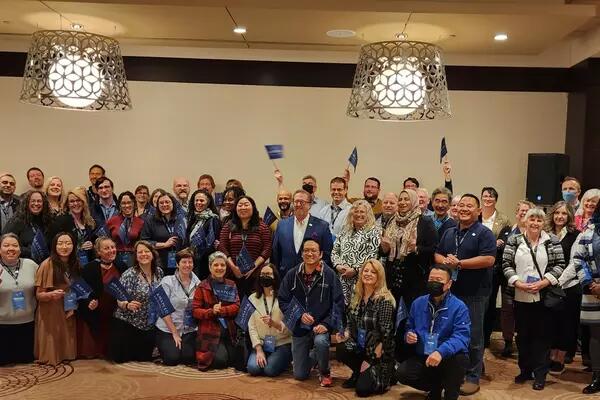Last revised: April 2020
Function
The Activists and Leaders Forum (ALF) is intended to provide activists and leaders with a non-governance means of regular contact, interactive communication, relationship building, and information and education sharing opportunities.
The forum provides an opportunity for the Board of Directors to connect with its senior activist base, to provide information updates, to seek input and feedback, to deliver education, and to communicate collective campaigns and strategies.
The forum further provides a setting for activists to build relationships with one another, to share the concerns of their constituency with the leadership, to acquire education and training, and to obtain information to be disseminated to their greater constituent membership.
Activists will represent identified constituencies on the basis of geographic location, bargaining unit affiliation, and equity and retiree caucus membership. Please see more details on the forum’s composition, below, for the initial membership list.
Guiding Principles
The Activists and Leaders Forum has no governance function but instead provides member constituencies of varying sizes, affiliations and locations, with a means of having their respective voices heard. As such, the forum’s composition will not be based on a strict representation by population model, but rather premised on equitable access and participation.
All members of the forum will participate in a respectful and constructive manner. The integrity of the forum rests upon the good judgment, discretion, and positive contributions of its participants. Applicable Codes of Conduct and the Union’s Equity Statement shall be in effect.
Oversight and Operation
Administration of the forum shall be the responsibility of the Board of Directors.
The forum shall meet 2 times per year with the first meeting of the year occurring in April and the second in October.
The Board of Directors shall schedule and publish meeting dates for the following year at the Union’s Annual Delegates’ Conference.
On behalf of the Board of Directors, the Executive Committee shall set the agenda for each meeting and members of the Board Executive will chair each session.
Individual meeting agendas shall be made available in advance and constituent members shall have the ability to suggest agenda items one month or more in advance of meetings.
Selection of Members
The fifteen members of the AMAPCEO Board of Directors and the 11 District Vice- Chairs are automatically members of the ALF. In addition, each of the identified activist constituencies will be responsible for selecting their representatives to participate in the forum as follows:
- District Executive Committees will appoint Community Leads who will attend meetings of the Forum. For the three Districts outside the City of Toronto, one Community Lead is to be appointed for each designated Community. The Executive Committee may ask the Delegates from each Community to select a Community Lead from among themselves, but if those Delegates are unable to agree, the full Executive will make the decision. For each of the nine Districts inside the City of Toronto, the District Executive will designate four Delegates to be Community Leads (and in the case of the two Toronto Districts with Community Chapters, the Executive will designate two Delegates from each designated Community as Leads if the Delegates within those Communities are unable to agree amongst themselves). Community Leads should be selected for one-year terms by District Executive Committees, with the selection occurring following Spring Delegate elections and no later than August 31st of each year, so that leaves can be processed in time to enable them to attend the October ALF meeting.
- Each Bargaining Unit Delegate will automatically be the representative on the forum for their unit. Each equity caucus and the retiree caucus will select their forum representative (and any temporary replacements) from among their members. The Chair of the Board Equity Committee will designate the Equity Committee representative.
- In the case of a Community Lead who is temporarily unable to attend a specific ALF meeting, the District Director is authorized to appoint a temporary alternate to attend that meeting – in the first instance, by selecting another Delegate from the Community (or the District, if it is not sub-divided into designated Communities); if no Delegate is available, from among the broader activist base; and in the final instance, if no Delegate is available, by selecting from among the general membership in the affected Community. Temporary appointments must be made in compliance with the relevant timelines for processing leaves to attend the affected meeting.
- There is no requirement or provision to temporarily replace a District Director or a Vice-Chair unable to attend a specific ALF meeting.
Activists and Leaders Forum Composition
Members will be selected from and by the following activist constituencies1
Activists: 66
Districts: 46
- Eastern Ontario:
- Durham Region: 1
- Kingston: 1
- Ottawa: 1
- Peterborough:1
- Northern Ontario:
- North Bay: 1
- Sault Ste. Marie: 1
- Sudbury: 1
- Thunder Bay: 1
- Western Ontario:
- Guelph/Waterloo/Wellington: 1
- London: 1
- Halton/Peel/Simcoe/York: 1
- St. Catharines/Hamilton: 1
- Windsor: 1
- GTA North
- Downsview: 2
- North York: 2
- Midtown:
- Bloor: 2
- St. Clair: 2
- Bay: 4
- College Park: 4
- Front: 4
- Queen's Park: 4
- Toronto Centre: 4
- University: 4
HARLO Bargaining Unit Delegates (1 per Unit)
- College of Midwives of Ontario: 1
- Financial Services Regulatory Authority of Ontario: 1
- Information and Privacy Commissioner of Ontario: 1
- Invest Ontario: 1
- Office of the Ontario Ombudsman : 1
- Pan Can Pharmaceutical Alliance: 1
- Ontario Arts Council: 1
- Ontario Health: Quality: 1
- Public Health Ontario: 1
- Supply Ontario: 1
- Waypoint Centre for Mental Health Care: 1
Caucuses: 11
- Equity: 9
- Young Workers: 1
- Retirees: 1
Leaders: 26
- District Directors: 11
- District Vice-Chairs: 11
- Executive Officers: 4
Total: 90
1 Changes to the constituent membership may be made from time to time at the discretion of the Board of Directors.


